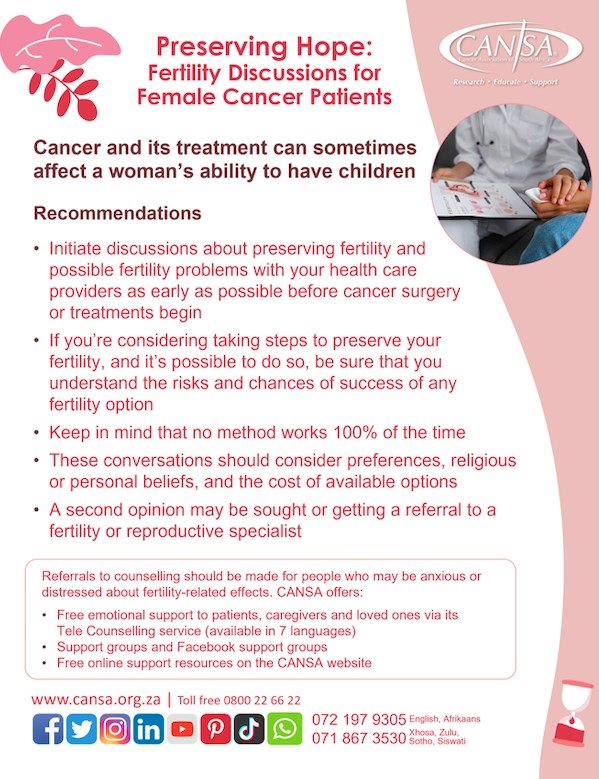
For these young women, the pursuit of fertility and motherhood suddenly took on a new dimension as they faced a profound and emotional challenge that could alter the course of their lives. The dream of nurturing a new life within their bodies now involved a struggle for their own health and survival. Cancer and its treatment can sometimes affect a woman’s ability to have children. There is limited data on contraceptive and fertility counselling needs for women with cancer in high and middle income countries including South Africa.
Lorraine Govender, national manager: Health Promotion at Cansa, says it is best that discussions about preserving fertility happens before cancer surgery or treatments begin. "The journey towards preserving fertility amidst a cancer diagnosis is still an important and delicate topic. It's best that discussions about various fertility options take place before cancer treatments begin and a good idea to initiate the discussion as the health care team might be focused on the treatment plan.
"If you’re considering taking steps to preserve your fertility, and it’s possible to do so, be sure that you understand the risks and chances of success of any fertility option you are interested in, and keep in mind that no method works 100% of the time."
A Cansa funded research study conducted in 2020 titled Contraceptive needs and fertility intentions of women with breast cancer in Cape Town, South Africa: a qualitative study reported the following results. Women reported receiving limited information from health care providers about contraceptive use and future fertility planning post treatment when fertility desires might change.
Many women reported limited information received from healthcare providers about the impact of cancer treatment on their future fertility. Most women did not receive information around fertility preservation options, and few were familiar with the concept. Providers focus was more on preventing pregnancy during treatment and ensuring a patient was on a non-hormonal contraceptive method, namely the IUD. However, providers recognised the need for a more holistic and multidisciplinary approach to breast cancer patient’s contraceptive and future fertility needs, despite there being limited fertility counselling and fertility options for women with cancer in the public sector.
Ashleigh Keulemans (32) remembers her engagement photo shoot in 2020 fondly. She and her partner were ready to start a new life together. But soon after the engagement, she received the devastating news – she had triple-negative breast cancer. Ashleigh was one of the fortunate patients whose oncologist discussed fertility preservation with her, and she could bank nine healthy eggs before starting her cancer treatment. After treatment, tests revealed that her ovaries were unproductive.
But then, a year and a half after treatment, she started menstruating again. After the wedding in September 2022, doctors informed her that although it’s improbable for a natural pregnancy to occur, it is not impossible. In June 2023, Ashleigh posted on Facebook: "Never stop believing in miracles. We are ecstatic to announce that our little miracle baby will be joining us early next year. Against all odds, our prayers were heard, and we have been blessed with the most precious gift."
Experts recommend health care providers who are part of the cancer care team be involved in talking about fertility with patients. Some recommendations include talking about any possible fertility problems that might happen due to treatment as early as possible, either before surgery or before treatment starts. Further, start talking about preserving fertility as early as possible, too, meaning before treatment starts. These conversations should consider preferences, religious or personal beliefs, and the cost of available options. A second opinion may be sought or getting a referral to a fertility or reproductive specialist.
Referrals to counselling should be made for people who may be anxious or distressed about fertility-related effects. Cansa offers free emotional support to patients, caregivers and loved ones via its Tele Counselling service (available in seven languages), support groups and Facebook support groups. Free online support resources are also available from the Cansa website.